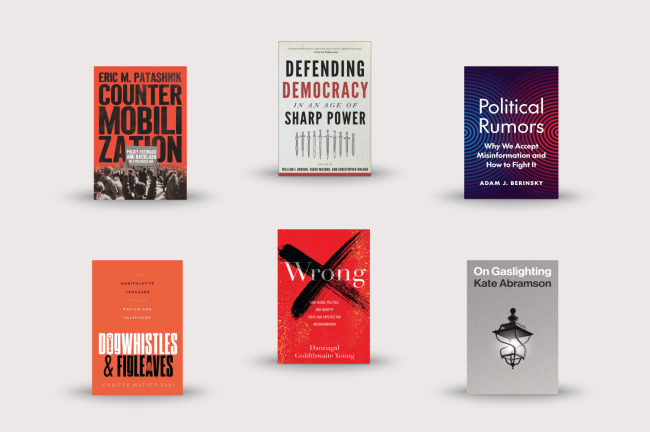You have /5 articles left.
Sign up for a free account or log in.

Jen Kim/Inside Higher Ed
Looking through the university-press catalogs for the fall, what stands out is a cluster of books on familiar issues sure to be even more heavily disputed after Labor Day, when presidential primary campaigning really starts in earnest. They take up questions about truth and its counterfeits, and about public influence and those who peddle it. Here’s a brief overview. Quoted material is taken from catalog listings, with publication dates as currently available from the presses’ websites.
Seldom do you hear anyone say a bad word about campaign finance reform, although nobody passes out holding their breath for it, either. Ann Southworth’s Big Money Unleashed: The Campaign to Deregulate Election Spending (University of Chicago Press, December) focuses on “a series of Supreme Court decisions finding that campaign finance regulations violate the First Amendment.” Attorneys and advocacy groups, and the wealthy donors behind them, “borrowed a litigation strategy pioneered by the NAACP to dismantle racial segregation and used it to advance a very different type of cause.” (From “one person, one vote” to “one dollar, one vote”?) The author cites “interviews, public records, and archival materials” to make her case.
“Nearly every area of US policymaking, from abortion rights to the Affordable Care Act,” comes under the sway of processes covered by Eric M. Patashnik’s Countermobilization: Policy Feedback and Backlash in a Polarized Age (University of Chicago Press, December). Patashnik’s focus is on “how policies stimulate backlashes by imposing losses, overreaching, or challenging existing arrangements to which people are strongly attached.” The author presents “case studies of issues from immigration and trade to healthcare and gun control.”
Authoritarian regimes are “no longer content with shoring up control over their own populations” but further seek “to erode the pillars of democratic societies,” maintain the contributors to Defending Democracy in an Age of Sharp Power (Johns Hopkins University Press, July), edited by William J. Dobson, Tarek Masoud and Christopher Walker. Dictatorships “spread disinformation, sow discord, and suppress dissent” by “weaponizing universities, institutions, media, technology, and entertainment industries,” and “even critical political institutions”—some of them, no doubt, involved in elections.
Outside forces may have a role in exporting what Adam J. Berinsky studies in Political Rumors: Why We Accept Misinformation and How to Fight It (Princeton University Press, August). But the vast majority of it is homegrown, with “a tendency toward conspiratorial thinking and vehement partisan attachment” constantly refreshing the supply. “Drawing on original survey and experimental data,” the author “argues that in fighting misinformation, it is as important to target the undecided and the uncertain as it is the true believers.”
If political bunk is always in supply, that’s because there’s a demand for it. Dannagal Goldthwaite Young’s Wrong: How Media, Politics, and Identity Drive Our Appetite for Misinformation (Johns Hopkins University Press, October) finds the hunger for it rooted in “a process of identity distillation encouraged by public officials, journalists, political and social media,” piqued by “political leaders and media organizations” that “separate, enrage, and—ultimately—mobilize us.” This does not sound counterintuitive. In any case, readers are promised “demand-side solutions that reduce the bifurcation of American society and increase our information ecosystem’s accountability to empirical facts.”
Plausible deniability is carefully cultivated by advocates of the most toxic forms of public discourse—especially through the “linguistic devices” Jennifer Saul considers in Dogwhistles and Figleaves: How Manipulative Language Spreads Racism and Falsehood (Oxford University Press, February). “Dog whistles” are political messages inaudible except by those in the know, as when “states’ rights” are invoked as a less overt call for segregation, while “fig leaves … take messages that could easily be recognized as unacceptable, and provide just enough cover that people become more willing to accept them.” (For example, slandering immigrants as rapists but adding “some, I assume, are good people.”) Dog whistles and fig leaves have made racist and conspiratorial discourse more normalized in public life.
Anyone criticizing such verbal sleight of hand risks being dismissed as hypersensitive or accused of imagining things. It’s one way to generate the effect Kate Abramson analyzes in On Gaslighting (Princeton University Press, March 2024). Gaslighting is “a form of interpersonal interaction, a particular way of fundamentally undermining someone,” that goes beyond spreading misinformation or even blatant deception. The gaslighter “aims to make his target experience herself as incapable of reasoning, perceiving, or reacting” with full confidence in her own faculties. In an interaction between two people, this is sadistic. As an element of political discourse, it amounts to cynicism on steroids.




